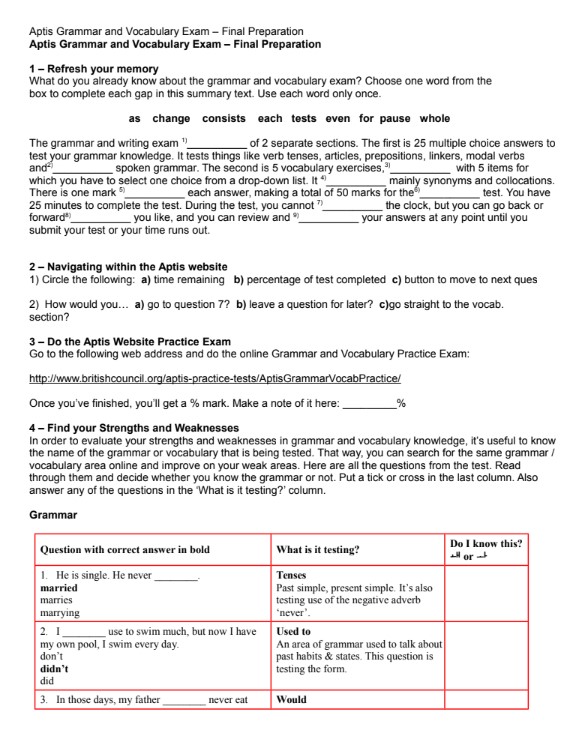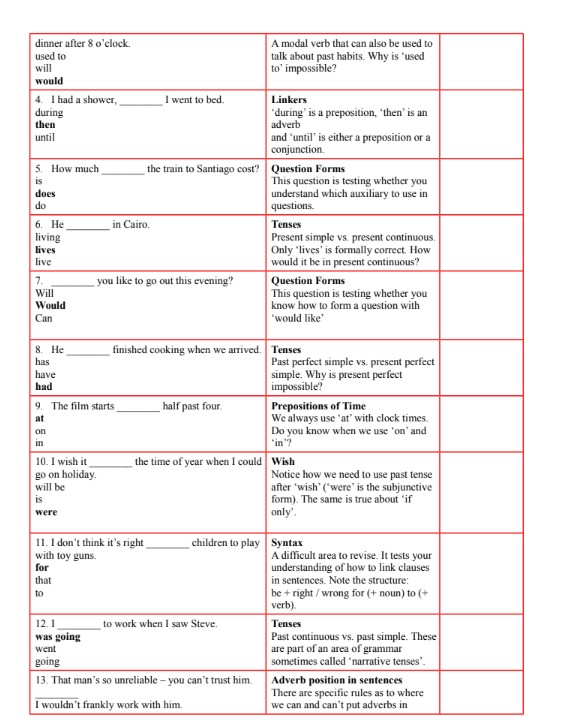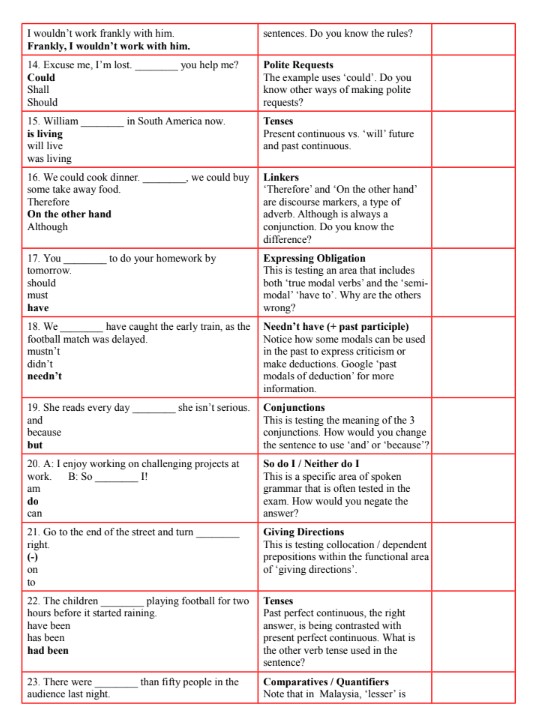


Hình 1:
Aptis Grammar and Vocabulary Exam – Final Preparation
Aptis Grammar and Vocabulary Exam – Final Preparation
1 – Refresh your memory
What do you already know about the grammar and vocabulary exam? Choose one word from the box to complete each gap in this summary text. Use each word only once.
as change consists each tests even for pause whole
The grammar and writing exam ¹) _______ of 2 separate tests. The first is 25 multiple choice answers to test your grammar knowledge. It tests things like verb tenses, articles, prepositions, conjunction, linkers, modal verbs and ³) _______ spoken grammar. The second is 5 vocabulary exercises.⁴) _______ with 5 items for which you have to select one choice from a drop-down list. It ⁵) _______ mainly synonyms and collocations. There is one mark ⁶) _______ each answer, making a total of 50 marks for the ⁷) _______ test. You have 25 minutes to complete the test. During the test, you cannot ⁸) _______ the clock, but you can go back or forward⁹) _______ you like, and you can review and ¹⁰) _______ your answers at any point until you submit your test or your time runs out.
2 – Navigating within the Aptis website
- Circle the following: a) time remaining b) percentage of test completed c) button to move to next ques
- How would you… a) go to question ?? b) leave a question for later? c) go straight to the vocab. section?
3 – Do the Aptis Website Practice Exam
Go to the following web address and do the online Grammar and Vocabulary Practice Exam:
http://www.britishcouncil.org/aptis-practice-tests/AptisGrammar-VocabularyPractice/
Once you’ve finished, you’ll get a % mark. Make a note of it here: _______ %
4 – Find your Strengths and Weaknesses
In order to evaluate your strengths and weaknesses in grammar and vocabulary knowledge, it’s useful to know the name of the grammar or vocabulary that is being tested. That way, you can search for the same grammar / vocabulary area online and improve on your weak areas. Here are all the questions from the test. Read through them and decide whether you know the grammar or not. Put a tick or cross in the last column. Also answer any of the questions in the ‘What is it testing?’ column.
Grammar
| Question with correct answer in bold | What is it testing? | Do I know this? ✓ or ✗ |
| 1. He is single. He never _______ marries | Tenses | Past simple, present simple. It’s also testing use of the negative adverb ‘never’. |
| 2. I _______ use to swim much, but now I have my own pool, I swim every day. | Used to | An area of grammar used to talk about past habits & states. This question is testing the form. |
| 3. In those days, my father ______ never eat | ||
| dinner after 8 o’clock. used | ||
| would | A modal verb that can also be used to talk about past habits. Why is ‘used’ to ‘impossible’? | |
| 4. I had a shower, _______ I went to bed. | Linkers | ‘during’ is a preposition, ‘then’ is an adverb and ‘until’ is either a preposition or a conjunction. |
| during | ||
| then | ||
| until | ||
| 5. How much _______ the train to Santiago cost? | Question Forms | This question is testing whether you understand which auxiliary is used in questions. |
| does | ||
| 6. He _______ in Cairo. | Tenses | Present simple vs. present continuous. Only ‘lives’ is formally correct. How would it be in present continuous? |
| lives | ||
| 7. Will _______ you like to go out this evening? | Question Forms | This question is testing whether you know how to form a question with ‘would like’. |
| Would | ||
| 8. He _______ finished cooking when we arrived. | Tenses | Past perfect simple vs. present perfect simple. Why is past perfect simple? |
| had | ||
| 9. The film starts _______ half past four. | Prepositions of Time | We always use ‘at’ with clock times. Do you know when we use ‘on’ and ‘in’? |
| at | ||
| 10. I wish it _______ time of year when I could go on holiday. | Wish | Notice how we need to use past tense after ‘wish’ (‘were’ is the subjunctive form). The same is true about ‘if only’. |
| were | ||
| 11. I don’t think it’s right _______ children to play with toy guns. | Syntax | A difficult area to revise. It tests your understanding of how to link clauses in sentences. Note the structure: be + right / wrong (for + noun) to (+ verb). |
| for | ||
| 12. I _______ to work when Steve. | Tenses | Past continuous vs. past simple. These are part of an area of grammar sometimes called ‘narrative tenses’. |
| was going | ||
| went | ||
| going | ||
| 13. That man’s so unreliable – you can’t trust him. | Adverb position in sentences | There are specific rules as to where we can and can’t put adverbs in sentences. Do you know the rules? |
| frankly, I wouldn’t work with him. | ||
| 14. Excuse me, I’m lost. _______ you help me? | Polite Requests | The example uses ‘could’. Do you know other ways of making polite requests? |
| Could | ||
| Shall | ||
| Should | ||
| 15. William _______ in South America now. | Tenses | Present continuous vs. ‘will’ and past continuous. |
| is living | ||
| will live | ||
| was living | ||
| 16. We could cook dinner, _______ we could buy some takeaway food. | Linkers | ‘Therefore’ and ‘On the other hand’ are discourse markers, a type of adverb. Although is always a conjunction. Do you know the difference? |
| Therefore, | ||
| On the other hand | ||
| Although | ||
| 17. You _______ to do your homework by tomorrow, should | Expressing Obligation | This is testing an area that includes both ‘true modal’ verbs and the ‘semi-modal’ ‘have to’. Why are the others wrong? |
| must | ||
| 18. We _______ have caught the early train, as the football match was delayed. | Needn’t have (+past participle) | Notice how some modals can be used in the past to express criticism or make deductions. ‘Google ‘past modals of deduction’ for more information. |
| mustn’t | ||
| didn’t | ||
| 19. She reads every day _______ and _______ because but | Conjunctions | This is testing the meaning of the 3 conjunctions. How would you change the sentence to use ‘and’ or ‘because’? |
| 20. A: I enjoy working on challenging projects at work. B: So ___! I | So do I / Neither do I | This is a specific area of spoken grammar that is often tested in the exam. How would you negate the answer? |
| do | ||
| can | ||
| 21. Go to the end of the street and turn right. | Giving Directions | This is testing collocation / dependent prepositions within the functional area of ‘giving directions’. |
| on | ||
| to | ||
| 22. The children _______ playing football for two hours before it started raining. | Tenses | Past perfect continuous, the right answer is compared with present perfect continuous. What is the other verb tense used in the sentence? |
| have been | ||
| had been | ||
| 23. There were _______ than fifty people in the audience last night. | Comparatives / Quantifiers | Note that in Malaysia, ‘lesser’ is sometimes used in this context, but this is seldom considered wrong in standard UK English. |
| fewer | ||
| few | ||
| lesser | ||
| 24. I just heard they are _______ get married in June. | Be going to (+ verb) | Often called ‘going to’, it’s a very common future form in English. |
| going to | ||
| go to | ||
| 25. If you were a better cook, you _______ eat out all the time. | Conditionals (2nd vs. 1st) | The correct answer is a second conditional. Why can’t it be ‘first conditional’? |
| wouldn’t | ||
| hadn’t |
Vocabulary
For the vocabulary, write ‘strong’, ‘OK’ or ‘weak’ in the self evaluation column, depending on how you did in the test:
| Answers | Choices | What is it testing? | Self-evaluation |
| Vocabulary 1 | go plan listen run speak get | begin | Verb Synonyms Testing knowledge of verb meaning. Notice that the first answer is a very ‘weak’ synonym, but it’s (probably) the best choice. |
| start = begin | |||
| talk = speak | |||
| pick = choose | |||
| Vocabulary 2 | cover – wrap | attend | Verb Synonyms Testing knowledge of verb meaning. Notice how some verbs are given on the left to ensure only one match is possible from the choices. |
| improve = change – adjust | assemble | ||
| state = make public – announce | approach | ||
| get somewhere – arrive | admit | ||
| put something together – assemble | arrange | ||
| accept | |||
| wrap | |||
| Vocabulary 3 | more and more | awkward | Collocations Testing knowledge of adjectives and adverbs. Most of the correct answers are ‘right’ because they collocate with a verb before the adjective or a noun after it. |
| go abroad for their holidays these days. | ancient | ||
| Drivers need to remain alert when in charge of a car. | ahead | ||
| The city has many ancient and interesting buildings. | adequate | ||
| She’s a highly articulate person who explains things clearly. | adult | ||
| He’s very aggressive – person always fighting into fights | aggressive | ||
| Vocabulary 4 | timetable = schedule | joint | Noun Synonyms Testing knowledge of noun meaning. |
| reward = prize | command | ||
| queue = line | mess | ||
| prize | |||
| fright | |||
| dock |



